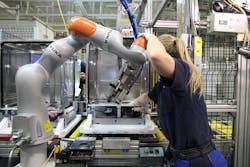Man or machine: What is AI?
More than 60% of U.S. employees welcome artificial-intelligence (AI) services like ChatGPT to help them make the right decision at the workplace, according to a survey conducted on behalf of Automatica, the global trade fair for smart automation and robotics that takes place in Munich June 27-30. Almost 80% of American workers, however, want such digital tools to be instantly recognizable as machines. The results of the Automatica trend index 2023 came from a study of 1,000 employees surveyed in the United States.
“Robotics and artificial-intelligence software like ChatGPT rapidly shape the workplace of the future,” said Patrick Schwarzkopf, advisory board member of Automatica at Messe Munich in Germany. “If we get the use of these technologies right, we can vastly improve workplaces.”
As machines and humans interact more closely, people in the United States are advocating for a human-in-command approach, according to the study, with 81% of participants indicating the use of digital technology needs to leave control to people, which is in line with the Good Work Charter of the European Robotics Industry, a guideline for introducing robotics and automation in a way that puts the human in the center.
The U.S. automotive industry illustrates the current changes taking place, as the government aims to reach a voluntary goal of 50% market share for electric-vehicle sales by 2030. Many manufacturers are now investing in industrial robotics and collaborative applications for final assembly and finishing tasks to master the transition. Workers embrace the benefits smart machines can provide. About 70% welcome robots in a factory, taking on the dirty, dull and dangerous jobs. When thinking about the future of work, about 20% of employees are seriously worried about the use of robots in a factory because workers need to have special training to use them. Another 42% have at least mixed feelings. About the same number of people welcome the machines as they lead to more qualified and better-paying jobs.
“We need to actively manage the transition to good collaboration between machines and humans, making sure that people are not left behind,” said Schwarzkopf. “How traditional manufacturing changes and how the workplace of the future will evolve is one of the key topics at the world´s leading exhibition for smart automation and robotics, Automatica 2023, in Munich, Germany.
A total of 5,000 participants in five countries were questioned for the Automatica 2023 trend index, representative of each country´s population, on how robots and digitization are changing the world of work. Messe München and VDMA Robotics + Automation, conceptual sponsor of the trade fair, are behind the concept of Automatica.

